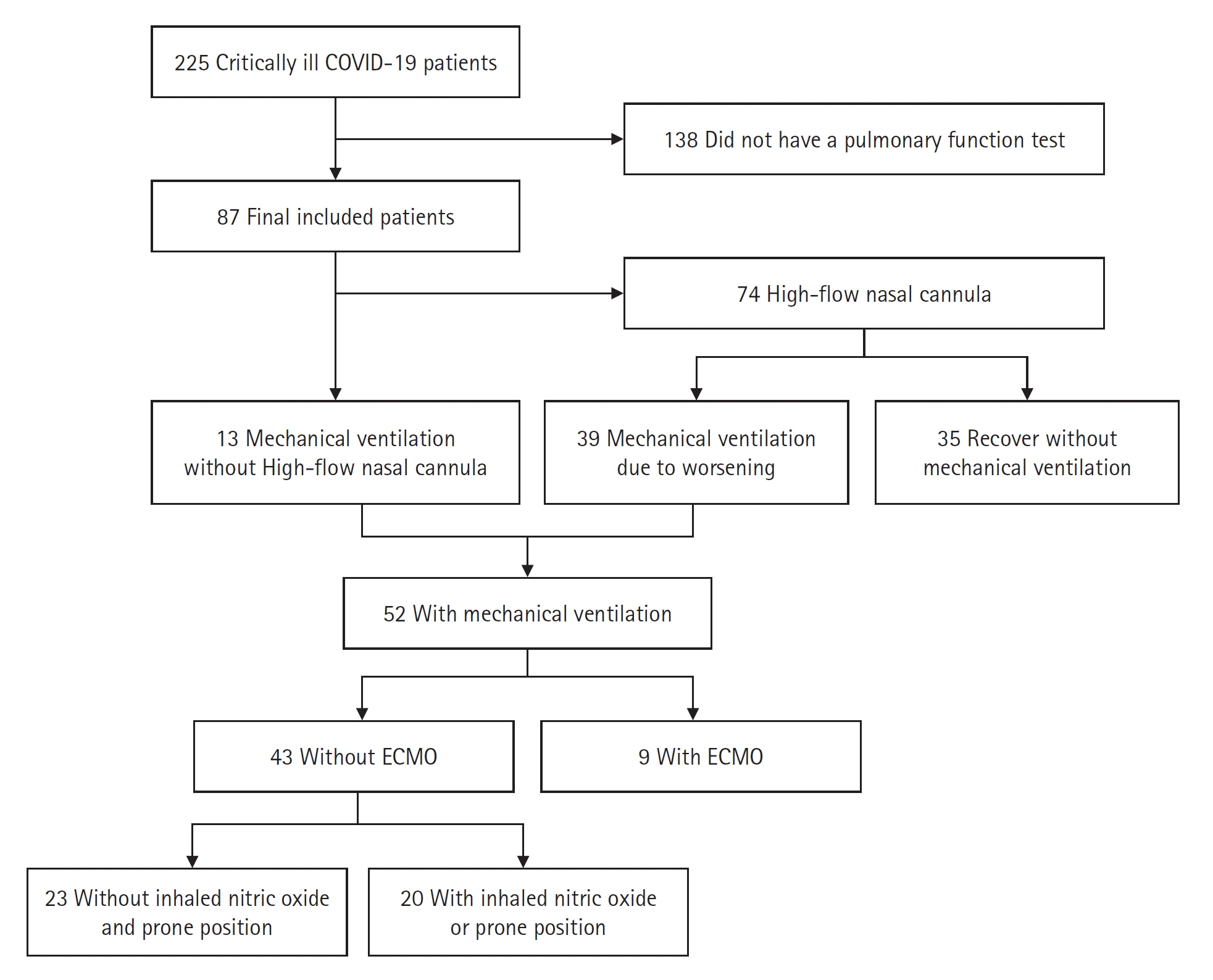Acute Crit Care.
2024 Feb;39(1):100-107. 10.4266/acc.2023.00668.
Factors related to lung function outcomes in critically ill COVID-19 patients in South Korea
- Affiliations
-
- 11Division of Pulmonary Medicine, Department of Internal Medicine, Keimyung University Dongsan Hospital, Keimyung University School of Medicine, Daegu, Korea
- 2Division of Pulmonary and Critical Care Medicine, Department of Internal Medicine, Seoul National University Bundang Hospital, Seoul National University College of Medicine, Seongnam, Korea
- KMID: 2555228
- DOI: http://doi.org/10.4266/acc.2023.00668
Abstract
- Background
New variants of the virus responsible for the coronavirus disease 2019 (COVID-19) pandemic continue to emerge. However, little is known about the effect of these variants on clinical outcomes. This study evaluated the risk factors for poor pulmonary lung function test (PFT). Methods: The study retrospectively analyzed 87 patients in a single hospital and followed up by performing PFTs at an outpatient clinic from January 2020 to December 2021. COVID-19 variants were categorized as either a non-delta variant (November 13, 2020–July 6, 2021) or the delta variant (July 7, 2021–January 29, 2022). Results: The median age of the patients was 62 years, and 56 patients (64.4%) were male. Mechanical ventilation (MV) was provided for 52 patients, and 36 (41.4%) had restrictive lung defects. Forced vital capacity (FVC) and diffusion capacity of the lung for carbon monoxide (DLCO ) were lower in patients on MV. Male sex (odds ratio [OR], 0.228) and MV (OR, 4.663) were significant factors for decreased DLCO . The duration of MV was associated with decreased FVC and DLCO . However, the type of variant did not affect the decrease in FVC (P=0.750) and DLCO (P=0.639). Conclusions: Among critically ill COVID-19 patients, 40% had restrictive patterns with decreased DLCO . The reduction of PFT was associated with MV, type of variants.
Figure
Reference
-
1. Song J, Park DW, Cha JH, Seok H, Kim JY, Park J, et al. Clinical course and risk factors of fatal adverse outcomes in COVID-19 patients in Korea: a nationwide retrospective cohort study. Sci Rep. 2021; 11:10066.
Article2. Grasselli G, Zangrillo A, Zanella A, Antonelli M, Cabrini L, Castelli A, et al. Baseline characteristics and outcomes of 1591 patients infected with SARS-CoV-2 admitted to ICUs of the Lombardy region, Italy. JAMA. 2020; 323:1574–81.
Article3. Oliveira TF, Rocha CA, Santos AG, Silva LC, Aquino SH, Cunha EJ, et al. Extracorporeal membrane oxygenation in COVID-19 treatment: a systematic literature review. Braz J Cardiovasc Surg. 2021; 36:388–96.
Article4. Eksombatchai D, Wongsinin T, Phongnarudech T, Thammavaranucupt K, Amornputtisathaporn N, Sungkanuparph S. Pulmonary function and six-minute-walk test in patients after recovery from COVID-19: a prospective cohort study. PLoS One. 2021; 16:e0257040.
Article5. Huang C, Huang L, Wang Y, Li X, Ren L, Gu X, et al. 6-Month consequences of COVID-19 in patients discharged from hospital: a cohort study. Lancet. 2021; 397:220–32.
Article6. Torres-Castro R, Vasconcello-Castillo L, Alsina-Restoy X, Solis-Navarro L, Burgos F, Puppo H, et al. Respiratory function in patients post-infection by COVID-19: a systematic review and meta-analysis. Pulmonology. 2021; 27:328–37.
Article7. World Health Organization. Clinical management of severe acute respiratory infection when novel coronavirus (2019-nCoV) infection is suspected: interim guidance, 28 January 2020 [Internet]. World Health Organization; 2020 [cited 2024 Jan 20]. Available from: https://apps.who.int/iris/handle/10665/330893.8. Yang S, Jang J, Park SY, Ahn SH, Kim SS, Park SB, et al. COVID-19 special report: COVID-19 outbreak report from January 20, 2020 to January 19, 2022 in the Republic of Korea [Internet]. Data Analysis Team, Central Disease Control Headquarters, Korea Disease Control and Prevention Agency (KDCA); 2022 [cited 2024 Jan 20]. Available from: https://www.kdca.go.kr/board/board.es?mid=a30501000000&bid=0031&list_no=719156&act=view#.9. Pellegrino R, Viegi G, Brusasco V, Crapo RO, Burgos F, Casaburi R, et al. Interpretative strategies for lung function tests. Eur Respir J. 2005; 26:948–68.
Article10. Hughes TD, Subramanian A, Chakraborty R, Cotton SA, Herrera MD, Huang Y, et al. The effect of SARS-CoV-2 variant on respiratory features and mortality. Sci Rep. 2023; 13:4503.
Article11. Huai Luo C, Paul Morris C, Sachithanandham J, Amadi A, Gaston DC, Li M, et al. Infection with the severe acute respiratory syndrome coronavirus 2 (SARS-CoV-2) Delta variant is associated with higher recovery of infectious virus compared to the alpha variant in both unvaccinated and vaccinated individuals. Clin Infect Dis. 2022; 75:e715–25.
Article12. Teyssou E, Delagrèverie H, Visseaux B, Lambert-Niclot S, Brichler S, Ferre V, et al. The Delta SARS-CoV-2 variant has a higher viral load than the Beta and the historical variants in nasopharyngeal samples from newly diagnosed COVID-19 patients. J Infect. 2021; 83:e1–3.
Article13. Mlcochova P, Kemp SA, Dhar MS, Papa G, Meng B, Ferreira IA, et al. SARS-CoV-2 B.1.617.2 Delta variant replication and immune evasion. Nature. 2021; 599:114–9.14. Zhang J, Xiao T, Cai Y, Lavine CL, Peng H, Zhu H, et al. Membrane fusion and immune evasion by the spike protein of SARS-CoV-2 Delta variant. Science. 2021; 374:1353–60.
Article15. Lewis KL, Helgeson SA, Tatari MM, Mallea JM, Baig HZ, Patel NM. COVID-19 and the effects on pulmonary function following infection: a retrospective analysis. EClinicalMedicine. 2021; 39:101079.
Article16. Anastasio F, Barbuto S, Scarnecchia E, Cosma P, Fugagnoli A, Rossi G, et al. Medium-term impact of COVID-19 on pulmonary function, functional capacity and quality of life. Eur Respir J. 2021; 58:2004015.
Article17. Compagnone N, Palumbo D, Cremona G, Vitali G, De Lorenzo R, Calvi MR, et al. Residual lung damage following ARDS in COVID-19 ICU survivors. Acta Anaesthesiol Scand. 2022; 66:223–31.
Article
- Full Text Links
- Actions
-
Cited
- CITED
-
- Close
- Share
- Similar articles
-
- Experience of Treating Critically Ill COVID-19 Patients in Daegu, South Korea
- Characteristics of Critically Ill COVID-19 Patients in Busan, Republic of Korea
- How We Have Treated Severe to Critically Ill Patients With Coronavirus Disease 2019 in Korea
- Risk factors associated with development of coinfection in critically Ill patients with COVID-19
- Treatment of Critically Ill Patients with Coronavirus Disease 2019


